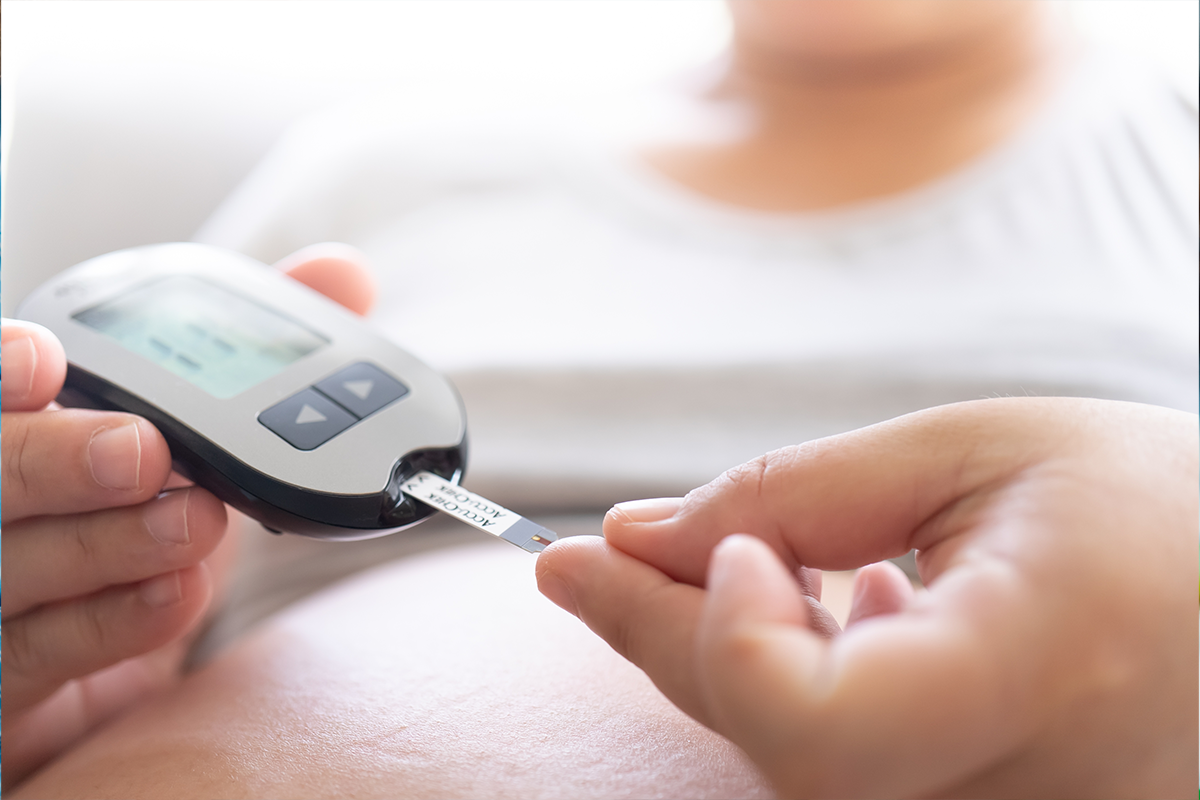Advertisement
Social for Good
Support platforms for people with diabetes
Fact-Checked
This article has been written and fact-checked by experts in the field.

Social media has changed our lives in many ways, and in recent years, many of the negatives have come to light as we continue to learn the nature of the beast. However, for many people, social media can—and does—change lives for the better.
This is particularly true when it comes to those in the diabetes online community.
Advertisement
Casey Seiden
Casey Seiden (@eat.well.together) is a registered dietitian, certified diabetes care and education specialist, wife, and mother. She’s also an influencer specializing in women’s health and gestational diabetes with over 38,000 followers.
Seiden started using her Instagram account to inspire couples to eat healthy together in 2018, but began focusing on women’s health and gestational diabetes in September 2019.
Her interest in helping women with gestational diabetes was born both unexpectedly and organically. When she became a dietitian in 2016, she started working with people with diabetes. And in 2019, she was presented with the opportunity to work in an obstetric clinic. At the time, she was also processing her own fertility journey.
These factors, along with her understanding that pregnancy is a critical, overwhelming time when women need a lot more nutritional support, guided her passion for supporting women in a positive and healthy relationship with food and their bodies.
Her Instagram account features short, light videos or posts ranging from targeting misconceptions about gestational diabetes to blood sugar-friendly ways to eat out or snack.
She fields multiple direct messages (DMs) almost daily from those thanking her for her free content.
“Women often put all the blame on themselves for developing gestational diabetes, and many women don’t enjoy the end of their pregnancy because of that, but it doesn’t have to be that way!” says Seiden.
Advertisement
Evelyn Riddell
Evelyn Riddell (@evie_ann) is currently completing her master’s thesis in history. She has long been an active part of the type 1 diabetes community and now shares posts about living with type 1 diabetes on her personal Instagram account—numbering more than 7,000 followers.
Modelling for her first Aerie (American Eagle loungewear line) campaign in 2018 propelled Riddell into the influencer space. A long-time fan of Aerie’s message of body positivity and inclusivity, she responded to an open casting call on Instagram and was eventually photographed with her insulin pump and continuous glucose monitoring device (CGM).
After that, she received feedback from others with type 1 diabetes who had previously been hesitant to wear their medical devices visibly, but who now felt ready to wear them openly and proudly, thanks to the campaign’s representation.
Passionate about raising awareness for what type 1 diabetes is, Riddell wants others to know that it is an autoimmune disease that cannot be prevented and currently has no cure.
She still uses her Instagram as a personal account and often receives questions in her DMs about living with diabetes. “It’s a wonderful place to have conversations with someone in the community you might not have met in person,” says Riddell.
Advertisement
Toby Smithson
Twelve years ago, Illinois-based Toby Smithson, registered dietitian and certified diabetes care and education specialist, launched Diabetes EveryDay (diabeteseveryday.com), a site dedicated to producing content related to all types of diabetes, and a YouTube channel with more content, including recipes.
Growing up, Smithson was taught to keep her own diagnosis of type 1 diabetes a secret. She learned how to manage her diabetes independently, but she also felt alone in her journey.
When a dietetic intern shared her type 1 diabetes diagnosis with Smithson in 1973, that changed. This chance encounter led Smithson to pursue a career in nutrition and helped her feel empowered. Her husband encouraged her to share her knowledge online.
When, three years ago, she stumbled across a YouTube influencer with no relevant credentials in the diabetes community posting inaccurate information, she was driven to post weekly YouTube videos herself. She posted response videos to some of his inaccurate posts and ramped up her own YouTube presence.
“Every time I watched the videos, I was screaming inside and outside my head,” Smithson recalls. “He had so many viewers and [he] didn’t have the answers to people’s questions.”
Smithson includes content ranging from what to do after a diabetes diagnosis and the importance of leisure time in managing diabetes to specifying carbohydrate content in various fruit servings. All resources on Diabetes EveryDay are offered without charge.
Tips from Diabetes EveryDay
Here are a few suggestions from Toby Smithson on research-backed natural blood sugar supports for those living with diabetes.
Get moving
Being active, or simply moving your body, helps with blood sugar management. Smithson suggests being strategic and intentional with movement. For instance, she makes a point of emptying the dishwasher after a meal.
Reach for veggies
Instead of reaching for the bread basket before a meal, research says that starting a meal with veggies before carbohydrates reduces post-meal blood sugar levels significantly when compared to eating carbohydrates before vegetables.
Eat more plants
Studies revealing the many health benefits of a plant-based diet continue to emerge. Some of these many benefits include managing blood sugar levels and reducing insulin resistance. Veggies and fruit can easily be added into your meals, or dedicate a particular day of the week to eating plant-based foods.
Focus on fibre
Eating foods high in fibre with your meal helps slow down your absorption of carbohydrates.
Carimé Lane is a Toronto-based freelance writer and criminal defence lawyer.
The scoop on diabetes online communities
A 2019 study reviewing the benefits and consequences of the diabetes online community concluded that the benefits of organic interactions online far outweighed any negative consequences. Here is a short summary of its findings.
Benefits |
| · Psychosocial benefits were found to be plentiful, including reduced diabetes burden, enhanced quality of life, shared experience, social support, and empowerment. |
| · Adults and adolescents who were using online communities conducted more self-care activities compared to those who were not. |
| · Multiple studies showed that adults and adolescents in the diabetes online community were participating to help others, even when the person helping didn’t need help in return. |
| · The diabetes online community was reported as being helpful 38 to 70 percent of the time. |
| · Misinformation was uncommon in online forums and blogs. Self-policing in the communities reportedly helped clear up misinformation. |
Consequences |
| · Between 0.07 and 1.8 percent of the diabetes online community reported the community did them minor harm. |
| · Some users of the diabetes online community reported purposefully avoiding excessively emotional posts. There were also reports of negative discussions surrounding type 1 and type 2 diabetes. |
| · Use of diabetes online communities by parents has been associated with parental hypoglycemia fear and parental stress frequency, although causation remains undetermined. |
| · For those with diabulimia (when someone with type 1 diabetes reduces or stops taking their insulin to lose weight), using online diabetes communities may threaten recovery. |
Online communities—beyond diabetes support
Are there benefits of peer support for other communities with common chronic conditions? Though recent high-level evidence on web-based peer support interventions is sparse, the evidence seems to indicate that such interventions bring significant improvements in social participation, self-efficacy, and health-directed activity for those with chronic medical conditions.





